Winter is here! Check out the winter wonderlands at these 5 amazing winter destinations in Montana
- Travel Tips

What Are Common Qualifications Needed For Hospitality And Tourism Careers
Published: December 13, 2023
Modified: December 28, 2023
by Audre Sommers
- Plan Your Trip
Introduction:
When it comes to pursuing a career in the hospitality and tourism industry, having the right qualifications is essential. This industry offers a wide range of diverse and rewarding opportunities, from hotel management and event planning to travel consultancy and culinary arts.
To excel in this field, aspiring professionals need to possess a unique blend of skills and knowledge that contribute to providing exceptional experiences for guests and customers. In this article, we will explore the common qualifications needed for hospitality and tourism careers, helping you understand what it takes to succeed in this dynamic industry.
Whether you’re just starting out or looking to advance your existing career, acquiring the right education, skills, and experience will open doors to exciting opportunities in this vibrant sector. From the front desk to the back end of operations, each role in the hospitality and tourism industry requires specific qualifications that contribute to the overall success of the organization.
So, let’s dive in and explore the qualifications needed to thrive in a career in hospitality and tourism.
Education Qualifications:
Education plays a significant role in preparing individuals for successful careers in the hospitality and tourism industry. While there are entry-level positions that may not require formal education, acquiring a relevant degree or certification greatly increases your marketability and job prospects.
For many management and supervisory roles in the industry, a bachelor’s degree is often preferred or required. Pursuing a degree in hospitality management, tourism, hotel administration, or a related field provides a solid foundation of knowledge and skills necessary for success in the industry.
These degree programs cover a wide range of topics, including hospitality operations, marketing, finance, customer service, event management, and leadership. They also often include internships or cooperative education opportunities, allowing students to gain hands-on experience in real-world hospitality settings.
However, it’s essential to note that formal education is not the only path to success in the hospitality and tourism industry. Many individuals have excelled in their careers through practical experience, on-the-job training, and professional development courses.
In addition to degree programs, there are various certificate programs available that focus on specific areas of the industry, such as culinary arts, event planning, hotel administration, and tourism management. These programs provide specialized knowledge and skills and can be a valuable asset in differentiating yourself from other candidates in the job market.
Continuing education is also crucial for professionals in this industry. As trends and technology evolve, ongoing learning is necessary to stay relevant and competitive. Attending workshops, conferences, and industry events and earning certifications in specialized areas demonstrate your commitment to professional growth and enhance your qualifications.
In summary, while formal education is not always mandatory, obtaining a relevant degree or certification greatly enhances your chances of securing higher positions within the hospitality and tourism industry. It provides you with a solid foundation of knowledge and skills, increases your marketability, and opens doors to exciting opportunities in this dynamic field.
Degree Programs in Hospitality and Tourism:
If you are looking to pursue a career in the hospitality and tourism industry, there are various degree programs that can equip you with the necessary knowledge and skills to excel in this field. These programs provide a comprehensive understanding of the industry, covering various aspects such as hospitality management, event planning, tourism marketing, and hotel operations.
Here are some of the common degree programs available in hospitality and tourism:
- Bachelor’s Degree in Hospitality Management: This program focuses on all aspects of hospitality operations, management, and leadership. Students learn about hotel and resort management, food and beverage management, event planning, customer service, marketing, and finance. The curriculum typically includes internships or cooperative education experiences to provide hands-on training.
- Bachelor’s Degree in Tourism Management: In this program, students gain an in-depth understanding of the tourism industry, including travel and destination management, tourism marketing, sustainable tourism practices, and tourism policy. They learn how to develop and promote tourism products and create exceptional experiences for travelers.
- Bachelor’s Degree in Hotel Administration: This program focuses specifically on hotel operations and administration. Students learn about front office management, housekeeping operations, revenue management, hotel marketing, and hospitality law. The curriculum often includes practical training in hotel operations to develop the necessary skills for managing a hotel effectively.
- Bachelor’s Degree in Event Management: This program is designed for individuals interested in planning and organizing events, conferences, and meetings. Students learn about event logistics, budgeting, marketing, vendor management, and creating memorable experiences for attendees. They gain hands-on experience by participating in event planning projects and internships.
These degree programs typically span four years and provide a combination of classroom instruction and practical training. Students learn from industry professionals, gain industry-specific knowledge, develop essential skills, and build a strong professional network.
Moreover, some universities and colleges also offer master’s degree programs in hospitality and tourism for individuals who want to pursue advanced positions in the industry or specialize in a specific area such as international hospitality management or tourism development.
By pursuing a degree program in hospitality and tourism, you acquire a broad range of knowledge and skills that are highly valued by employers in the industry. You develop a deep understanding of the intricacies of the industry, learn how to manage and lead teams effectively, and gain practical experience that prepares you for the challenges of the dynamic hospitality and tourism sector.
Certificate Programs:
In addition to formal degree programs, there are also certificate programs available for individuals interested in pursuing a career in hospitality and tourism. These programs offer specialized training in specific areas of the industry and are designed to enhance your skills and knowledge in a shorter timeframe compared to a full-degree program.
Here are some popular certificate programs in the field of hospitality and tourism:
- Culinary Arts Certificate: This program focuses on the culinary skills and techniques necessary for working in the food and beverage industry. Students learn about food preparation, kitchen operations, menu planning, and nutrition. A culinary arts certificate can lead to a career as a chef, sous chef, or line cook in hotels, restaurants, and other food service establishments.
- Event Planning Certificate: This program provides training on planning and executing events of various scales. Students learn about event logistics, vendor management, budgeting, and marketing. With this certificate, you can pursue a career as an event planner or coordinator, working in hotels, convention centers, or event management companies.
- Hotel and Resort Management Certificate: This program focuses specifically on the operations and management of hotels and resorts. Students gain knowledge about front office operations, housekeeping management, revenue management, and guest services. This certificate can open doors to entry-level management positions in the hospitality industry.
- Tourism and Travel Certificate: This program provides a comprehensive understanding of the tourism industry, including travel agency operations, tour planning, destination marketing, and customer service. Graduates of this certificate program can pursue careers as travel consultants, tourism coordinators, or destination marketing specialists.
These certificate programs are often offered by vocational schools, community colleges, and professional training institutes. They typically have shorter durations ranging from a few months to a year. Certificate programs are a great option for individuals who want to enhance their skills in a specific area of the industry or for those who are looking to enter the industry quickly.
While certificate programs may not carry the same level of recognition as a degree program, they provide valuable industry-specific training and can be a valuable addition to your resume. They demonstrate your commitment to professional development and can set you apart from other candidates in the job market.
It’s important to note that some certificate programs may have prerequisites or require prior experience in the industry. Additionally, some organizations offer professional certifications in specialized areas such as revenue management, event planning, or hotel operations. These certifications require passing an exam and demonstrate your expertise in a specific field.
Overall, certificate programs in hospitality and tourism are a great way to gain targeted knowledge and skills in a shorter timeframe. They provide valuable training and can help you stand out in the competitive job market, allowing you to pursue a successful career in this diverse and dynamic industry.
Language Skills:
In the hospitality and tourism industry, having strong language skills is crucial due to the global nature of the field. As a professional in this industry, you will interact with guests and travelers from different cultures and backgrounds. Being able to communicate effectively in multiple languages can significantly enhance your career opportunities and provide a higher level of service to your customers.
Here are some reasons why language skills are important in the hospitality and tourism industry:
- Enhanced Communication: Speaking the language of your guests allows you to understand their needs and preferences better. This enables you to provide personalized customer service and create a more comfortable and enjoyable experience for them.
- Building Rapport: When you can converse with guests in their native language, it helps foster a connection and build rapport. This creates a positive impression and can lead to higher guest satisfaction and loyalty.
- Breaking Language Barriers: Language barriers can hinder effective communication and lead to misunderstandings. By having language skills, you can bridge these gaps and ensure smooth interactions, improving overall guest experience.
- Upselling and Cross-Selling: Being able to communicate in multiple languages allows you to effectively promote additional services or amenities to guests. You can highlight the features and benefits in a language they understand, increasing the chances of upselling and cross-selling.
- Understanding Cultural Nuances: Language skills often come hand in hand with cultural insights. When you can communicate in a guest’s language, you also gain a deeper understanding of their cultural norms, customs, and preferences. This knowledge allows you to provide a more culturally sensitive and personalized experience.
Language skills can be acquired through formal education, language courses, immersion programs, or self-study. It’s important to focus on learning languages that are most relevant to the destinations or clientele you wish to serve.
While it may not be practical or necessary to become fluent in multiple languages, having a basic understanding of key phrases and greetings can go a long way in creating a positive impression. Additionally, utilizing translation tools and technology can also assist in overcoming language barriers.
Overall, language skills are highly valued in the hospitality and tourism industry. They enable you to provide exceptional service, connect with guests on a deeper level, and navigate cultural differences. By investing time and effort in developing your language abilities, you can enhance your career prospects and excel in this global industry.
Interpersonal Skills:
In the hospitality and tourism industry, having strong interpersonal skills is essential for building meaningful connections with guests and providing exceptional customer service. Interpersonal skills refer to the ability to effectively communicate, relate, and interact with others. These skills play a crucial role in creating positive experiences and fostering long-lasting relationships with guests and colleagues.
Here are some key interpersonal skills that are highly valued in the hospitality and tourism industry:
- Effective Communication: Good communication skills are essential for conveying information clearly, listening attentively, and understanding the needs and expectations of guests. It involves verbal, non-verbal, and written communication skills.
- Empathy and Emotional Intelligence: Being able to understand and empathize with the feelings and perspectives of others is crucial in providing excellent customer service. It involves being attentive, responsive, and demonstrating genuine care for guests’ well-being.
- Teamwork: Collaboration and teamwork are integral to the success of any hospitality and tourism establishment. Being able to work effectively with colleagues from diverse backgrounds, departments, and cultures contributes to a positive work environment and ensures smooth operations.
- Flexibility and Adaptability: The hospitality and tourism industry is fast-paced and dynamic, requiring individuals to be flexible and adaptable. Being able to handle unexpected situations, adapt to changes, and manage multiple tasks simultaneously is essential.
- Conflict Resolution: Dealing with guest complaints or conflicts requires effective problem-solving and conflict resolution skills. Being able to remain calm, listen to concerns, and find mutually beneficial solutions contributes to guest satisfaction and loyalty.
- Positive Attitude: Maintaining a positive and friendly demeanor is crucial in creating a welcoming and enjoyable atmosphere for guests. A positive attitude is infectious and can significantly enhance the overall guest experience.
Developing and honing interpersonal skills can be achieved through practice, training, and self-awareness. Participating in role-playing exercises, attending workshops, and seeking feedback from mentors or supervisors can help enhance these skills.
It’s important to remember that interpersonal skills are not only important in guest interactions but also in building relationships with colleagues and superiors. Strong interpersonal skills contribute to effective teamwork, a positive work environment, and professional growth within the industry.
Overall, possessing strong interpersonal skills is vital in the hospitality and tourism industry. These skills enable you to connect with guests, provide exceptional customer service, and work effectively as part of a team. By continuously developing and refining your interpersonal skills, you can excel in this people-oriented industry and contribute to memorable guest experiences.
Customer Service Skills:
Customer service is at the heart of the hospitality and tourism industry. To succeed in this field, it is essential to possess excellent customer service skills to ensure guest satisfaction and loyalty. Providing exceptional service goes beyond meeting basic needs; it involves creating a memorable experience that exceeds expectations. Here are some key customer service skills that are highly valued:
- Attentiveness: Being attentive and responsive to guest needs and requests is crucial in delivering excellent customer service. Anticipating and addressing their needs promptly shows that you value their experience.
- Empathy: Demonstrating empathy involves understanding and relating to the feelings and experiences of guests. It involves listening actively, showing understanding, and being sensitive to their needs and concerns.
- Patience: Maintaining patience and composure, especially in challenging situations, is essential in delivering quality customer service. Resolving conflicts calmly and patiently ensures that guests feel supported and valued.
- Problem Solving: Being able to identify and resolve guest issues efficiently is crucial in providing excellent customer service. Having strong problem-solving skills allows you to find creative solutions and turn negative experiences into positive ones.
- Product Knowledge: Being knowledgeable about the products, services, and amenities of your establishment allows you to provide accurate information and recommendations to guests. This helps in meeting their specific needs and enhancing their overall experience.
- Professionalism: Maintaining a professional demeanor and appearance instills confidence in guests and reflects positively on the establishment. It involves being reliable, punctual, and respectful in all interactions.
- Positive Language and Tone: Using positive and friendly language, as well as an upbeat tone, creates a welcoming atmosphere and helps in building rapport with guests. It conveys warmth, friendliness, and a willingness to assist.
- Time Management: Being efficient in managing time ensures that guests receive prompt and timely service. It involves prioritizing tasks, staying organized, and balancing multiple responsibilities effectively.
- Adaptability: Being adaptable to different guest preferences, cultural expectations, and changing circumstances is crucial in delivering personalized customer service. It involves tailoring your approach and communication style to best serve each individual guest.
Developing and honing customer service skills can be achieved through training, practice, and continuous self-improvement. Taking advantage of customer service workshops, role-playing exercises, and seeking feedback from guests and supervisors can help enhance these skills.
Remember, exceptional customer service is the key to guest satisfaction, repeat business, and positive word-of-mouth. By consistently demonstrating exceptional customer service skills, you contribute to creating unforgettable experiences and building a strong reputation in the hospitality and tourism industry.
Problem-Solving Skills:
In the fast-paced environment of the hospitality and tourism industry, problem-solving skills are crucial for addressing challenges and ensuring smooth operations. As a professional in this field, you will encounter various issues that require quick thinking, resourcefulness, and effective decision-making. Here are some key aspects of problem-solving skills that are highly valued:
- Analytical Thinking: In problem-solving, analytical thinking is essential for gathering and analyzing information, identifying patterns, and understanding the root cause of issues. It involves breaking down complex problems into manageable components to find viable solutions.
- Creativity: Coming up with innovative and creative solutions is important in the dynamic hospitality and tourism industry. Being able to think outside the box, consider alternative perspectives, and generate novel ideas improves the problem-solving process and leads to improved guest experiences.
- Resourcefulness: Resourcefulness involves utilizing available resources effectively to solve problems. This includes leveraging technology, collaborating with team members, and thinking creatively to find solutions within time and budget constraints.
- Decision-Making: Making sound decisions in a timely manner is crucial when faced with problems. This skill involves evaluating available options, considering potential consequences, and selecting the most appropriate course of action. It may require prioritizing conflicting objectives and embracing calculated risks.
- Collaboration: Collaboration with team members and stakeholders is often necessary in problem-solving. This involves seeking input from others, actively listening to their perspectives, and working together to find the best solution. Strong collaboration fosters a supportive and innovative work environment.
- Adaptability: The ability to adapt and adjust strategies or approaches is essential when solving problems in the hospitality and tourism industry. Flexibility allows for quick responses to changing circumstances, unexpected events, and evolving guest needs.
- Communication: Effective communication is crucial in problem-solving, as it allows for clear articulation of issues, sharing of ideas, and collaboration with others. Being able to convey information clearly, actively listen, and convey solutions to stakeholders is vital.
Cultivating problem-solving skills can be achieved through experience, training, and continuous learning. Actively seeking opportunities to solve problems, participating in workshops or seminars, and seeking feedback from colleagues or mentors can all contribute to skill development.
Problem-solving skills are highly valued in the hospitality and tourism industry, as they contribute to the effective and efficient resolution of issues. By honing these skills, you become a valuable asset to your organization, ensuring exceptional guest experiences and smooth operations.
Leadership Skills:
In the hospitality and tourism industry, strong leadership skills are essential for managing teams, driving organizational success, and creating a positive work environment. Effective leaders inspire and motivate others, provide guidance and direction, and foster a culture of excellence. Here are some key leadership skills that are highly valued:
- Communication: Effective communication is foundational to leadership. It involves clearly conveying expectations, providing feedback and guidance, and listening to the needs of team members. Strong communication skills foster trust, collaboration, and open lines of communication.
- Decision-Making: Leaders are responsible for making informed decisions that drive the success of the organization. This skill involves gathering relevant information, analyzing potential outcomes, and selecting the best course of action. Effective decision-making contributes to organizational growth and employee engagement.
- Empathy and Emotional Intelligence: Leaders who demonstrate empathy and emotional intelligence are better able to understand and connect with their team members. They recognize and value their emotions and perspectives, fostering a positive work environment and building strong relationships based on trust and mutual respect.
- Strategic Thinking: Leaders must have the ability to think strategically, seeing the bigger picture and planning for the long-term success of the organization. This skill involves analyzing market trends, identifying growth opportunities, and adapting to changing industry dynamics.
- Delegation: Effective leaders understand the importance of delegation. They trust their team members and assign tasks appropriately, empowering individuals to take ownership and develop their skills. Delegation allows leaders to focus on higher-level responsibilities and ensures the efficient completion of tasks.
- Conflict Resolution: Leaders need to be skilled in resolving conflicts and managing issues within the workplace. This involves actively listening to all parties, mediating disagreements, and finding mutually beneficial solutions. Strong conflict resolution skills foster a harmonious work environment and promote collaboration.
- Mentoring and Coaching: Good leaders invest in the development and growth of their team members. They provide guidance, offer constructive feedback, and create opportunities for learning and development. Mentoring and coaching foster employee engagement and professional growth.
- Adaptability: The hospitality and tourism industry is fast-paced and constantly evolving. Leaders need to be adaptable, embracing change, and effectively leading their teams through transitions. This involves being open-minded, flexible, and resilient.
Developing leadership skills requires continuous learning and self-improvement. Opportunities for growth include attending leadership development programs, seeking feedback from mentors or supervisors, and taking on leadership responsibilities within your organization.
Effective leaders are instrumental in driving success and creating a positive work culture within the hospitality and tourism industry. By honing leadership skills, you can inspire and motivate your team, drive organizational growth, and shape the future of your organization.
Technical Skills:
In addition to the interpersonal and leadership skills required in the hospitality and tourism industry, having relevant technical skills is crucial for success in this field. These technical skills are specific to the various roles within the industry and contribute to the efficient operation of hospitality establishments. Here are some key technical skills that are highly valued:
- Computer Proficiency: Basic computer skills are essential for most positions in the industry. Familiarity with word processing, spreadsheet, and presentation software is crucial for administrative tasks, data analysis, and communication.
- Property Management Systems (PMS): PMS software is used for managing hotel reservations, guest services, room inventory, and financial transactions. Proficiency in using PMS software is important for front desk staff, reservation agents, and hotel managers.
- Point of Sale (POS) Systems: POS systems are used in restaurants, bars, and cafes to process orders, track sales, and manage inventory. Understanding and using POS systems effectively is important for food and beverage staff.
- Food Safety and Hygiene: Knowledge of food safety regulations, proper food handling, and hygiene practices is crucial for those working in the culinary and food service industry. This ensures the delivery of safe and high-quality food to guests.
- Event Planning Software: Event planners often utilize specialized software for managing event logistics, registration, and attendee management. Proficiency in event planning software can streamline processes and enhance efficiency in event management.
- Language Skills: As mentioned earlier, language skills play a significant role in providing excellent customer service. Proficiency in multiple languages allows for better communication with guests from different regions and cultural backgrounds.
- Accounting and Financial Management: Understanding financial management, budgeting, and basic accounting principles is important for individuals responsible for managing finances within hospitality establishments. This includes tracking expenses, managing revenue, and analyzing financial statements.
- Knowledge of Travel and Tourism Industry: Having a solid understanding of the travel and tourism industry, including popular destinations, travel trends, and transportation options, is important for travel consultants and tour guides.
- Technical skills in specific areas: Depending on the role, specific technical skills may be required. These can include culinary techniques, mixology skills, audiovisual equipment operation, spa therapy techniques, or knowledge of sales and marketing tools.
Developing technical skills can be achieved through formal education, on-the-job training, attending workshops or specialized courses, and keeping up with industry trends and advancements. Employers often provide training and may require certification in specific technical areas.
Having relevant technical skills enhances your job prospects and productivity within the hospitality and tourism industry. It allows you to effectively carry out specific tasks, adapt to technological advancements, and contribute to the overall efficiency and success of your organization.
Conclusion:
The hospitality and tourism industry offers a range of exciting and rewarding career opportunities. To thrive in this dynamic field, individuals must possess the right qualifications and skills. Throughout this article, we have explored the common qualifications needed for hospitality and tourism careers.
Education qualifications, such as degree programs and certificate courses, provide a strong foundation of industry-specific knowledge and skills. These programs cover various aspects of the industry, including hospitality management, tourism marketing, event planning, and hotel operations.
Language skills, including multilingual proficiency, enhance communication and facilitate meaningful connections with guests from diverse backgrounds. Interpersonal skills contribute to fostering positive relationships and ensuring exceptional customer service, while problem-solving skills enable professionals to navigate challenges and find effective solutions.
Leadership skills are vital for managing teams, driving organizational success, and creating a positive work environment. Additionally, possessing relevant technical skills, such as computer proficiency, knowledge of property management systems, and food safety, contributes to efficient operations in different roles within the industry.
To succeed in the hospitality and tourism industry, individuals should continuously develop and refine these qualifications and skills. This can be achieved through formal education, on-the-job training, professional development programs, and open-mindedness to embrace industry trends.
By possessing the right qualifications and skills, individuals can unlock a world of opportunities in various sectors of the hospitality and tourism industry, such as hotels, resorts, restaurants, event management companies, travel agencies, and more. With dedication, a passion for service, and a commitment to ongoing growth, you can embark on a fulfilling and successful career in this vibrant and ever-evolving industry.

- Privacy Overview
- Strictly Necessary Cookies
This website uses cookies so that we can provide you with the best user experience possible. Cookie information is stored in your browser and performs functions such as recognising you when you return to our website and helping our team to understand which sections of the website you find most interesting and useful.
Strictly Necessary Cookie should be enabled at all times so that we can save your preferences for cookie settings.
If you disable this cookie, we will not be able to save your preferences. This means that every time you visit this website you will need to enable or disable cookies again.
What to Know About Hospitality and Tourism Management Degree Programs
Hospitality management degrees are designed to train future leaders in the hospitality industry.
How to Study Hospitality Management

Getty Images
Running a company in any segment of the hospitality industry requires not only financial and marketing prowess, but also an understanding of how to create an inviting environment for guests.
The art and science of hosting strangers is an essential skill for people working in many kinds of businesses, including airlines, casinos, cruise ships, festivals, hotels and restaurants.
Running a company in any segment of the hospitality industry requires not only financial and marketing prowess, but also an understanding of how to create an inviting environment for guests. Cultivating that marketable skill set is the goal of associate, bachelor's and graduate programs in hospitality management.
What a Hospitality Management Degree Is and What Classes It Requires
The goal of any course of study in hospitality management is to train people to create and maintain spaces where others will immediately feel at home.
“Understanding how to take care of the customer is a foundational aspect of the hospitality discipline,” Angela Ramsey, senior director of communication at the University of Nevada—Las Vegas William F. Harrah College of Hospitality, explained in an email.
Hospitality management degrees are, foremost, degrees in business, says Michael Sabitoni, chair of the food and beverage management department and the international travel and tourism studies department at Johnson & Wales University in Rhode Island. They include classes in accounting, finance, human resources, law and technology, he says.
However, unlike a general business degree, a hospitality degree typically includes specialized coursework focusing on the hospitality industry, such as classes on food service business operations, event management principles, and hotel and resort leadership, Sabitoni says. An overview class about tourism is also typically included in hospitality management programs, and industry internships are often mandatory, he adds.
Many hospitality degree programs require students to participate in experiential learning by helping to operate a student-run hotel or restaurant. They may also contain classes on:
- Eco-tourism or sustainable travel
- Global tourism and special considerations involved with international trips
- Customer service protocols
- Assessing the quality of guest experiences
- Specific types of hospitality establishments, such as country clubs, golf courses, resorts, stadiums, timeshares or theme parks
- Nuances involved in planning certain kinds of events, such as conventions or weddings
- Concerns that face certain demographics of customers, including women and people of color
- Various types of tourism, including business trips and visits to cultural destinations or historical sites
Top Undergraduate Schools With Hospitality Management Majors
Many U.S. colleges and universities allow undergraduates to major in hospitality management, including multiple nationally renowned academic institutions. Cornell University of New York, an Ivy League college, has a school devoted to hospitality.
Exceptional hospitality programs are often based in major metropolitan areas that attract significant tourism. For example, New York University and Boston University in Massachusetts offer a hospitality management degree.
How to Know if a Hospitality Management Degree Is Right for You
An interest in the food and beverage sector, a love for travel or an interest in entertaining people may lead someone to consider pursuing a degree in hospitality management. But prospective students should be aware that the hospitality sector has leadership roles for people with all kinds of interests and personalities.
Though some managerial positions in the hospitality industry are customer-facing jobs that require significant people skills, there are also back-of-the-house managerial jobs that concentrate on logistics, Sabitoni says.
Significant cultural awareness and strong communication abilities are essential in hospitality. Foreign language skills are also valuable but not mandatory, Sabitoni says.
What You Can Do With a Hospitality Management Degree
Hospitality programs are designed to train future leaders in the sector.
“It can include anything within the hospitality vertical, from hotel investment companies to real estate firms to our big brands which are the Marriotts, the Hiltons, the Four Seasons, to data analytics companies to Googles to Amazons,” says Kate Walsh, dean of the Peter and Stephanie Nolan School of Hotel Administration at Cornell. “Anything that touches hospitality as a part of their business product is something where our students get involved.”
Real estate investment firms often invest in hotel buildings, so people with degrees in hospitality management sometimes find jobs in the real estate sector, Walsh says. Alumni of hospitality management programs sometimes become management consultants who concentrate on assisting companies in the hospitality industry, she adds.
Executive and director roles in the industry typically require at least a bachelor's degree. Many high-level leadership positions at U.S. hospitality firms pay annual salaries above $70,000, according to an article published by Monster.com, a job website.
In 2020, graduates of Cornell's Nolan School had an average base salary of slightly over $69,000 and an average bonus of nearly $15,000, according to the school's employment report .
Considerations for Potential Hospitality Students
Aspiring hospitality managers should be aware of trends that may affect them when they enter the industry, experts say.
This sector has severe labor shortages at hotels and restaurants, many of which laid off workers due to pandemic-related safety measures and now have struggled to replace those workers even after raising wages.
Because of these staffing concerns, many hospitality companies have introduced initiatives to recruit and retain talented staff, improve working conditions, increase job satisfaction and reduce employee turnover, Walsh says.
When comparing hospitality programs, prospective students should investigate whether those programs include experiential learning opportunities, experts say, noting that hands-on projects are one of the best ways to gain hospitality skills. It’s also optimal if hospitality schools offer courses on design, which can inform aesthetic choices about how a hospitality venue looks, according to experts.
“I think the industry needs innovative thinkers," Walsh says. "They need people who think big culturally, who are comfortable with different modes of work, so it’s a great time to join the industry. The industry is trying to be extremely intentional in providing compelling career paths.”
Searching for a grad school? Get our complete rankings of Best Graduate Schools.
Grad Degree Jobs With $100K+ Salaries

Tags: Travel , food and drink , education , students , graduate schools , colleges
You May Also Like
Questions to ask ahead of law school.
Cole Claybourn May 31, 2024

Tips for Secondary Med School Essays
Cole Claybourn May 30, 2024

Ways Women Can Thrive in B-School
Anayat Durrani May 29, 2024

Study Away or Abroad in Law School
Gabriel Kuris May 28, 2024

A Guide to Executive MBA Degrees
Ilana Kowarski and Cole Claybourn May 24, 2024

How to Choose a Civil Rights Law School
Anayat Durrani May 22, 2024

Avoid Procrastinating in Medical School
Kathleen Franco, M.D., M.S. May 21, 2024

Good Law School Recommendation Letters
Gabriel Kuris May 20, 2024

Get Accepted to Multiple Top B-schools
Anayat Durrani May 16, 2024

Premeds and Emerging Medical Research
Zach Grimmett May 14, 2024

- Request Info
- Bachelor's Degrees
- Master's Degrees
- Ph.D. & Doctoral Degrees
- Grad Certificates
- Professional Ed
- Undergraduate Minors, Certificates, & Training
- Professional Development & Training
- Credit Courses
- Noncredit Courses
- All-University Core Curriculum
- Free Online Courses
- Osher Lifelong Learning Institute
- Professional Ed d
- Contact Us d

Select one of the options below:
Tourism Management M.T.M.
CSU's online master's in tourism management helps you develop your business management acumen, enhance your knowledge of industry practices, and understand the social and environmental impacts of global tourism — so you can live the lifestyle you love while working to create positive experiences for others.
Gain the advanced skills to thrive in an evolving industry
Global events, an evolving market, and new technology have all changed the way people engage in tourism activities. As a result, more consumers now seek regional experiences with greater personalization and a focus on sustainable, meaningful, and authentic experiences.
Start building the industry-specific knowledge you need to become a well-rounded leader in a tourism management role.
Learn a whole-system approach
Gain foundational skills as you study a holistic, integrated approach to sustainable tourism management. Explore technological and strategic business solutions that can help you operate a more agile, streamlined operation. Investigate the social and environmental impacts of this evolving industry as you learn to balance the ethical treatment of people and resources while running a profitable venture.
Throughout this master’s program, you will learn:
- Financial management processes and tools
- Effective marketing and communication strategies
- How to use data to gain insight and guide business decisions
- How to strategically and ethically manage both people and resources
Inspired by exploring the outdoors or regional cultures? Looking to align who you are with what you do? Tourism offers many options for shifting into a new career or advancing into a management role within the industry.
Build the specialized skills to make a meaningful impact on the world while doing something you love.
Gain a competitive career advantage with employers specializing in:
- Hospitality and resort management
- Outdoor and adventure travel
- Tourism management
- Destination management or marketing
- Event management
- Cruise management
- Agritourism
Start your own tourism venture
Our graduates have established roles in a variety of tourism settings all over the country and world. Some examples are numerous hotels, City Parks and Recreation Departments, and more specifically – Beaver Creek Resorts, The Cliff Lodge – Snowbird, Visit Fort Collins, Vail Resorts, U.S. Forest Service, Into the Vineyard - Wine-Inspired Travel, Adventure Sixty North, Natural Habitat Adventures, Colorado Forest Restoration Institute, Yellowstone Campgrounds, Cruise Norway, Steamboat Spring Chamber of Commerce, Universal Studios Beijing, and Taiwan Ministry of Tourism.
Graduates work in tourism positions relating to marketing, operations, event planning, and some have even founded their own companies. This program has helped students enter the tourism industry, as well as elevate their career if they were already in the tourism field.
"My online learning experience with CSU was amazing. All the professors were amazing and got back to me in a timely manner. They are so knowledgeable, helpful, and kind. They answered all my questions. I’m grateful to be part of this community."

Current role : Founder, Adumu Safaris
"The Tourism Management program at CSU significantly elevated my expertise in sustainable tourism and adventure travel and expanded my network of social entrepreneurs. With this knowledge, I established Adumu Safaris, a socially responsible safari tour company aimed at empowering my Maasai tribe in Tanzania through community-accountable ecotourism. CSU's training equipped me with leadership, finance, and sustainable tourism skills, which I now use to create transformative journeys for travelers."

Caroline R.
"My graduate program at CSU has been instrumental in my current position, where I oversee multiple departments within a hotel/lodge. The ski area management certification and M.T.M. skills I gained are vital in running a successful resort. Learning about resort finances, creating memorable guest experiences, and fostering guest loyalty have been invaluable. Connecting with professors, like skiing with one at Snowbird, provided valuable insights. My advice to current and prospective students: Engage with professors to gain informative career guidance. CSU's program equipped me with the knowledge and tools necessary for success in my industry, particularly in hotel operations and finance."
As a student in CSU’s online tourism management master’s program, you receive the same education, learn from the same faculty, and earn the same regionally accredited degree as students on campus. Additionally, you can expect:
- The Ability to Graduate in Less than a Year: In just nine months you can earn an industry-specific master’s degree that helps set you apart when seeking employment or advancement in the tourism industry.
- A Focus on People and the Planet: Learn to provide meaningful travel experiences for clients while making business decisions grounded in sustainability and social responsibility. Explore the types and extent of tourism impacts on natural resources. Discover methods for reducing the ecological footprint of tourism activities and destinations. Learn how to increase tourism's contribution to natural resource conservation while improving human welfare in the process.
- Preparation in Fact-Based Decision-Making: This program incorporates courses in global tourism policy (NRRT 662) and two courses in quantitative analysis (NRRT 601 and 602) to equip you with the knowledge needed to make smart, meaningful business decisions driven by data.

Alan Bright, Ph.D.
Alan's teaching responsibilities include on-campus and distance coursework for the M.T.M. program and courses in the natural resource tourism program. Alan's primary research interests center around theoretical applications of social psychological constructs toward the management of natural resources, including values, attitudes, behavior, and the complexity with which people think about issues. These constructs are also considered in the context of attitude and behavior change. Alan's teaching interests focus on development and administration of coursework in the tourism undergraduate and graduate programs.

Christina T. Cavaliere, Ph.D.
Cavaliere is an environmental social scientist with a focus on linking tourism and biocultural conservation. Her areas of research involve the human dimensions of socio-ecological systems including tourism impacts. She serves as an Assistant Professor of Human Dimensions of Natural Resources in the Warner College of Natural Resources at Colorado State University in Fort Collins, Colorado. Dr. Cavaliere investigates aspects of sustainability and climate change impacts related to gender, conservation, aviation, wildlife, and governance. View Dr. Cavaliere’s full bio .

Stuart Cottrell, Ph.D.
Stuart teaches courses in ecotourism, sustainable tourism development, protected area management, and research in human dimensions of natural resources. His research focus includes sustainable tourism, travel and tourism behavior, visitor impact management, and public perceptions of landscape disturbance issues. Present projects involve a National Science Foundation grant to examine land management agency and water provider perception of pine beetle impacts on water quality. As a former resident fellow with the School for Global and Environmental Sustainability, Stuart conducted a preliminary study of the impacts of mountain pine beetle infestation on recreation and tourism, which led to the present NSF project. One of the highlights of Stuart's teaching involves the monitoring of diseased corals and volunteer based conservation projects for an NGO in the Bahamas.

David Knight, Ph.D.
David has developed a unique transnational skill-set in sustainability and tourism management living and working in the U.S., Spain, the Philippines, Peru, and China. Drawing from experience as director, educator, researcher, consultant, collaborator, and confidant, David’s growing university-level leadership underscores his passion for partnerships and diversity in working with real-world organizations and communities to provide tangible, experiential learning opportunities for students. His research and consulting projects for organizations operating from local to international levels have analyzed a variety of sustainability and tourism issues pertaining to National Parks, Chinese tourist behavior, marine protected areas, and rural (e.g., Machu Picchu) community development. Ultimately, David hopes to employ his experience, compassion, and intellect to support institutions of higher learning in empowering diverse communities through exceptional outreach, student recruitment/retention, advising, teaching, and research activities.

Mike Manfredo, Ph.D. Head
Michael’s research focus is on understanding human thought about wildlife and natural resources. The goals of his current research program are: to increase the availability of human dimensions information relevant to wildlife and natural resource management; to provide for increased understanding of the role of human dimensions information in natural resources decision-making; to facilitate the integration of human dimension information into the natural resource decision-making process.

Dr. Sarah Walker
Dr. Sarah Walker’s research uses an environmental justice lens to investigate the role well-being can play in helping us better understand people’s relationships with their environments. Specifically , she studies human well-being in the context of climate resilience and adaptation in vulnerable communities around the world. Her work also investigates the well-being benefits of spending time in nature. Sarah received her PhD from Colorado State University and is currently completing her post-doctoral training at University of Colorado Boulder. She’s an avid hiker and cyclist, and loves being in the classroom with students.

Lina Xiong, Ph.D.
Lina Xiong is an assistant professor in the Department of Human Dimensions of Natural Resources. She is also called "Dr. Bear," because her last name in Chinese means bear. Dr. Bear came to the U.S. in 2006 from mainland China. Lina completed her Ph.D. in Business Administration from Temple University in Philadelphia. Before coming to CSU, Dr. Bear had taught many business courses in the College of Business at Marshall University. Her teaching assignment at CSU includes tourism strategic management, tourism marketing, and advanced lodging in the Master of Tourism Management program. She is also responsible for developing several M.T.M. courses in mandarin. Dr. Bear's research interests include service management, internal branding, employee brand motivation, and customer loyalty. She has published several articles in hospitality management journals. Recently, Dr. Bear's dissertation, titled, "Employee Brand Internalization: The Central Route to a Brand Aligned Workforce," has received a Highly Commended Award of the 2014 Emerald/EFMD Outstanding Doctoral Research Awards in the Hospitality Management category. This is a prestigious international annual award presented by Emerald and the European Foundation for Management Development (EFMD). She has worked in hospitality and tourism businesses in both China and the U.S.
What is tourism management?
Tourism management is a field of study that explores the theory and practice of creating, overseeing, and marketing tourism ventures. Management professionals in the tourism industry typically require skills in leadership, finance, and business operations. The online tourism management program offered by CSU has a unique focus on natural resource management and tourism policy.
What can I do with a degree in tourism management?
As the industry continues to evolve, there are many new and unique opportunities for professionals with an advanced tourism management degree. Graduates of the online Master of Tourism Management program will be qualified to work in fields that include: hospitality and resort management, outdoor and adventure travel, event management, agri-tourism, ecotourism, and more. Anyone intending to create their own tourism enterprise will also benefit from completing this program.
Why study tourism management?
There are numerous rewarding career opportunities in the tourism industry for people with the right skills. In the U.S. alone, tourism supports more than 15 million jobs and generates nearly $2 trillion in economic output, according to the U.S. Travel Association. Working in this industry is often appealing to individuals with a passion for travel, exploration, adventure, and the outdoor lifestyle. The primary goal of tourism ventures is to provide customers and clients with positive experiences.
What jobs can I get with a tourism management degree?
Graduates of the tourism management master’s program gain the managerial skills to create entrepreneurial ventures, or take leadership roles in the industry. Career opportunities in tourism management range from agri-tourism to hospitality and resort management. Students gain the skills to build careers as tourism program directors, event coordinators, sales managers, account executives, marketing managers, customer experience managers, and many others.
What is the average salary for hospitality and tourism?
Salaries vary widely in the hospitality and tourism industry depending on the specific job, region, and other factors. According to Glassdoor, the average annual salary (U.S.) for a tourism marketing manager is $80,673, and the average salary for a hotel manager is $59,461. The median annual salary for a resort manager is $46,342, according to PayScale.com.
What is sustainable tourism management? What is ecotourism management?
Sustainable tourism management is an approach to the business of tourism that values the environment and social responsibility as much as profit. Ecotourism is a subset of sustainable tourism that primarily focuses on exotic, remote, and/or threatened natural areas such as rainforests, coral reefs, and other fragile ecosystems. The typical goal of ecotourism is to promote the conservation of these areas by helping tourists experience them while creating minimal or no environmental impact. A portion of profits from some ecotourism ventures may also be used to help fund various conservation efforts.
Can I get a graduate certificates along with this master’s degree?
Yes. You can apply up to 12 credits of the Communication for Conservation certificate toward the Master of Tourism Management degree.
What is the average timeframe to complete the program?
The online Master of Tourism Management can be completed in two semesters. However, for students who are working full-time, this is likely an unrealistic timeframe. The average student completes the program in two years, but some students may take longer. The flexible, online program allows you to earn your degree at a pace that suits your lifestyle and goals.
Are summer classes an option?
No. All coursework in the program is during the fall and spring semesters.
What fees should I expect to pay in addition to tuition?
In addition to the tuition, students will pay a $32/semester technology fee. There will also be an added cost for books and texts.
The Master of Tourism Management requires completion of 30 credits, with a minimum of four elective credits.
All courses are eight weeks with some courses offered the first part of a semester and others in the second part of a semester. Please work with a Program Coordinator to determine your approved course plan:
Kathryn Metzger Program Coordinator, Tourism Enterprise Program (970) 491-7617 [email protected]
Linda Sawyers Program Coordinator, Tourism Enterprise Program (970) 491-7592 [email protected]
M.T.M. Curriculum
Fall semester: first 8-week session.
- NRRT 600 – Tourism Industry Concepts and Practices (2 cr.)
- NRRT 620 – Organizational Management in Tourism (2 cr.)
- NRRT 655 – Tourism Marketing Concepts and Applications (2 cr.)
- NRRT 679A – Current Topics in Nature-Based Tourism (1 cr.)
Fall Semester: Second 8-week Session
- NRRT 608 – Nature, Outdoor Recreation - Human Well-Being (2 cr.)
- NRRT 615 – Sustainable Tourism Development Foundations (2 cr.)
- NRRT 650 – Financial Management in Tourism (2 cr.)
- NRRT 679B – Current Topics in Nature-Based Tourism (1 cr.)
Spring Semester: First 8-week Session
- NRRT 601 – Quantitative Analysis in Tourism I (2 cr.)
- NRRT 677 – Project Management and Event Planning (2 cr.)
- NRRT 671 – Strategic Management for Travel and Tourism (2 cr.)
- NRRT 567 – Tourism Entrepreneurship (2 cr.)
Spring Semester: Second 8-week Session
- NRRT 609 – Tourism and Conservation (2 cr.)
- NRRT 625 – Communication/Conflict Management in Tourism (2 cr.)
- NRRT 678 – Tourism Leadership (2 cr.)
- NRRT 667 – Applied Experiential Learning in Tourism (2 cr.)
Elective Options:
Students can take the electives listed below or other electives may be approved by an advisor.
You may substitute some of the M.T.M. courses with electives from the Communication for Conservation graduate certificate program.
The are some additional options, such as RRM 520 – Lodging Management , available as well. Please contact your Program Coordinator to determine your approved course plan.
Application Deadlines
Start your application online and upload materials directly into the online system. You can save your progress and return any time.
Applications are reviewed once they are completed. You can expect to be notified of your application status within two weeks of submitting all application materials.
1 Review Admission Requirements
The tourism management master's degree requires that students have the following:
- Bachelor's degree from a regionally-accredited institution.
- A 3.0 GPA on all undergraduate coursework. For applicants who do not meet the 3.000 cumulative GPA requirement, this is an alternative admission pathway. Applicants can gain formal admission if they have a cumulative GPA between 2.800 and 3.000 or have a cumulative GPA below 2.800 and have taken six credits of regular, graduate‐level coursework (500 level or higher) at CSU and obtain a B or better in all courses.
- GRE scores are not required.
2 Prepare Application Materials
- A Statement of Purpose essay describing how this program aligns with your goals and why you’re applying for this degree.
- Your Resume or Curriculum Vitae (CV).
- Two letters of recommendation (generally from professional or academic references).
- One transcript from EACH university attended (if previous course work has been completed at Colorado State University-Fort Collins, transcripts are not required).
Please Note: Students may be unconditionally admitted and registered in their first semester of courses with an unofficial transcript. Official transcripts must be submitted, prior to or during your first semester, before you can register for your second semester of graduate work. Failure to meet this condition will result in your dismissal from the Graduate School.
- Digital Transcripts must be submitted by the originating institution using a secure service such as parchment, eScrip-Safe, the National Student Clearinghouse, or e-Quals. Transcripts received via e-mail are considered unofficial. Use institution code 4075 for Colorado State University or [email protected] if the secure service requires an email address.
- Graduate Admissions
- Colorado State University - Office of Admissions
- 1062 Campus Delivery
- Fort Collins, CO 80523-1062
3 Complete Online Application
Complete the online graduate application and pay the nonrefundable application processing fee (payable online). As soon as you have completed the required information, please submit your application. Your application will not be reviewed until it is complete and all required materials have been received.
- Select "Tourism Management (M.T.M.) – Distance" when choosing the program of study.
4 Request Official Transcripts
Request one official transcript of all collegiate work completed from all institutions attended. Transcripts from Colorado State University are not required. Transcripts must be received directly from the originating institution to be considered official.
Electronic (preferred): Digital Transcripts must be submitted by the originating institution using a secure service such as parchment, eScrip-Safe, the National Student Clearinghouse, or e-Quals. Transcripts received via emails are considered unofficial. Use institution code 4075 for Colorado State University or [email protected] if the secure service requires an email address.
Mail (if necessary) Graduate Admissions Colorado State University – Office of Admissions 1062 Campus Delivery Fort Collins, CO 80523-1062
Check Your Application Status
View your application status at any time to ensure your application checklist is complete or to check on updates.
For International Applicants
Proof of English language proficiency is required for applicants from countries or United States territories where there are official languages other than (or in addition to) English. This includes the U.S. territories of American Samoa, Guam, the Northern Mariana Islands, and Puerto Rico.
Learn more about English language proficiency requirements .
We love learning about your goals and answering any questions you have.

Program Details
- 3.0 GPA on all undergraduate coursework
- Math Entrance Exam scores recommended for applicants who have not taken the required prerequisites within the past 10 years
Application Dates
Request information.
By providing your information, you consent to receive calls, emails, and/or text messages from CSU Online. Consent not required to purchase goods or services. For more info, call 1-970-491-5288 . We respect your privacy . This site is protected by reCAPTCHA and the Google Privacy Policy and Terms of Service apply.
- Accreditation
- Dates & Deadlines
- Faculty & Staff Resources
- Classroom Locations
- p (970) 491-5288
- e 2545 Research Blvd. Fort Collins, CO 80526
- Privacy Information
- State Authorization Disclaimer
- Equal Opportunity
- College of Hospitality, Retail and Sport Management
- Location Location
- Contact Contact
- Colleges and Schools
- Degree Programs
- Tourism Management (B.S)
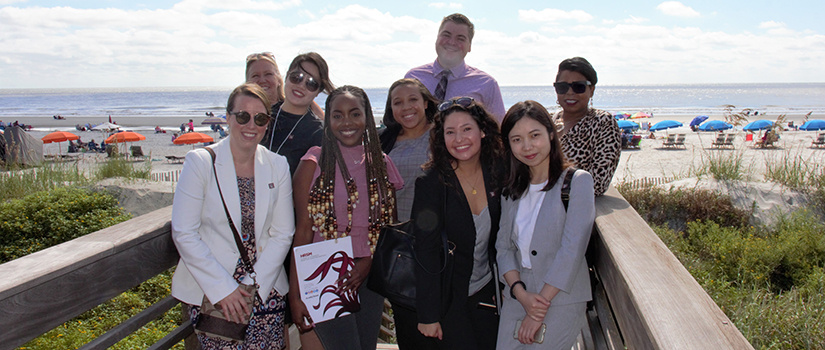
Tourism Management, B.S.
Tourism is one of the largest and fastest growing job markets in the country, and the School of Hospitality and Tourism Management prepares students for global careers that blend business management and a passion for delivering exceptional customer experiences.
The University of South Carolina is ranked among the top 12 in the nation and No. 25 in the world for hospitality and tourism management. Its Bachelor of Science in Tourism Management degree program empowers students to thrive in a global industry that connects cultures, inspires adventure, changes lives and drives economies.
Tourism is a dynamic field of study that integrates destination marketing, hospitality, attraction management, event planning and more—all working together to attract a wide range of visitors to a location.
Tourism management majors begin their studies with a strong business foundation—accounting, economics, business law, communications and computer applications. The degree program builds upon this foundation with industry-specific curriculum, such as destination marketing, festival planning, sustainable tourism, tourism management and more. Students can also add a minor in event management.
The Bachelor of Science in Tourism Management degree is accredited by the Accreditation Commission for Programs in Hospitality Management and requires 120 credit hours, including:
- 51 hours of credits in the HRTM major, including internships
- 30 hours of foundational, management-focused courses
- 31-43 hours of Carolina Core
Sample Course Overview
Freshman year.
English Foreign language Foundations of tourism Natural science History Hotel management Introduction to hospitality Mathematics / statistics University 101
Sophomore Year
Accounting Business communications Business law Club management Conference and meeting planning Economics Food and beverage production Resort development and management International hotel management Purchasing and controls
Junior Year
Festival planning and management Hospitality / tourism electives Hospitality / tourism internship Literature / fine arts Personnel organization and supervision Principles of management Principles of marketing Professional development seminar Services management

Senior Year
Sustainable tourism planning Hospitality finance Hospitality / tourism analytics Hospitality / tourism marketing Hospitality management strategies Revenue management Tourism information technology Wine and spirits in food service establishments Financial management
For more details about the degree requirements and curriculum for the B.S. in tourism management, please visit the academic bulletin .
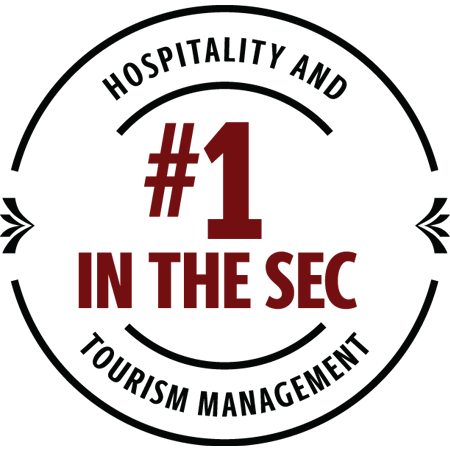
Atop the SEC
The University of South Carolina ranks among the top 12 schools in the U.S. and atop the SEC for hospitality and tourism management according to the ShanghaiRanking's 2023 Global Ranking of Academic Subjects.
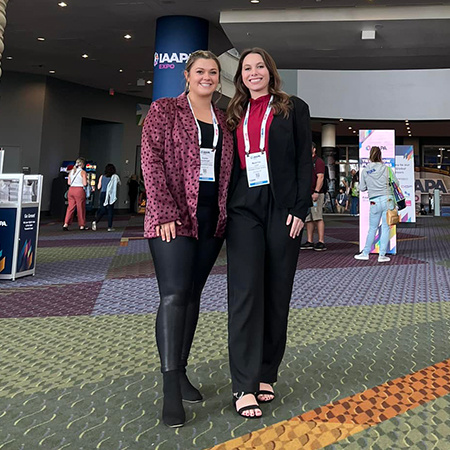
Industry Opportunities
When you're one of the top schools in the nation for hospitality and tourism management, it means you have some of the best and brightest students preparing to join the industry. Students are able to get a head start on their professional careers with opportunities to attend some of the biggest conferences in the world, like the annual IAAPA Expo, the global attractions industry's premier event.

Get Involved
There are endless ways to get involved on campus at USC through student organizations designed to enrich your education and expand your network. The theme parks and attractions club is just one of the tourism-related organizations you can join.
Undergraduate Internship Requirement
Every tourism management major graduates with career-related work experiences, or internships, on their resume. This experience can be any job in the tourism industry and can include responsibility in a managerial or supervisory position where student's gain leadership experience. To learn more, visit our internships page .
Career Success
The college provides dedicated internship directors, experienced faculty and corporate engagement resources to help students get the most out of opportunities to work with companies such as the U.S. Travel Association, Sea Island Resort, Disney World, convention and visitors bureaus, departments of parks and recreation, airlines, as well as resorts, theme parks and other local and regional attractions and festivals.
Explore With Study Abroad
Immersion in international experiences broadens horizons and prepares students for exciting work opportunities around the world. Our faculty lead custom study abroad courses in China, South America and Europe. The school also offers two semester-long exchange programs with partner hospitality universities in Aruba and the Galápagos Islands .

Galápagos Islands
The Galápagos Islands offer students a special opportunity to become totally immersed in a global learning environment that epitomizes subjects on sustainable tourism, tourism photography, scuba diving, and much more.
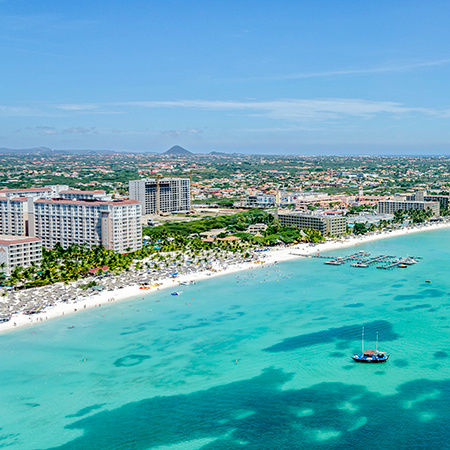
Students interested in tourism and hospitality management can study next to the blue waters of the Caribbean Sea as they learn about tourism economies, hotel management, destination marketing, event management, cruise ship management, and more.
Learning Outcomes
- Students should be able to apply business management principles to identify problems and utilize analytical reasoning to formulate local-to-global solutions.
- Students should be able to identify, evaluate and explain tourism impacts on the host community and global environment.
- Students should be able to examine and apply tourism policy and planning principles to match the needs of diverse stakeholders, destinations and environments.
- Students should be able to demonstrate an understanding of the concepts and characteristics of tourism as an academic area of study.
- Students should be able to understand the products, processes, structure(s) and interactions in the tourism system.
Get in Touch

Laura Nix Bishop
Recruitment Coordinator College of Hospitality, Retail and Sport Management
[email protected] 803-777-HRSM (4776)
Challenge the conventional. Create the exceptional. No Limits.

Become a CTP ®

To earn the CTP ® designation, a candidate will need to pass assessment provided by the CTP® Body of Knowledge. Applicants must meet the following criteria:
• University graduate of Bachelors degree in Tourism or related course from an accredited university or college • If not university graduate of Hospitality degree, a candidate must complete a minimum 120 hours of CTP® executive course • Minimum 250 hours in hospitality work experience • Two references from work supervisor, university registrar or CTP® member • Signed ITHP Professional Code of Conduct
- Faculty Careers
- Faculty Resources
- Panther180 Login
Search this website
Department information and typical discipline-specific academic degree & qualifications 1 of faculty within hospitality and tourism management.
The School of Hospitality and Tourism Management offers Bachelor's and Master's degrees in Hospitality Management and Certificate Programs that combine practical experience with classroom theory to assist the student to gain the understanding, skills, and techniques needed to qualify for job opportunities, and to achieve his or her career goals in the hospitality/tourism industry. With the cooperation of industry executives, the School has created an internship program which literally utilizes the hotels, resorts, restaurants, clubs, airlines, travel agencies, and cruise lines as practice labs for students. The advanced phase of the internship program provides each student a structured training experience normally not available to a student until he or she has entered the industry after graduation. An Industry Advisory Board - which includes outstanding executives in the lodging, foodservice, and tourism industries - works regularly with the faculty, staff, and students of the School to formulate and update a curriculum that is current, flexible, and related to the needs of the hospitality and tourism industries.
Degrees offered
The Hospitality and Tourism Management Department offers these programs:
- BS in Hospitality Management
- BS/MS in Hospitality Management
- MS in Hospitality Management
Terminal Degree 2 for each discipline taught in Hospitality and Tourism Management
- Ph.D. in Hospitality Administration/Management (52.0901)
Related Disciplines 3
- Food Service Systems Administration/Management (19.0505) - all courses
Related Disciplines 3 for specific courses
- Accounting (52.0301) - HFT 2401, 3403, 4464, 4474
- Accounting and Finance (52.0304) HFT 2401, 3403, 4464, 4474
- Computer and Information Sciences (11.0101) - HFT 2441, 3423, 3764
- Computer Science (11.0701) - HFT 2441, 3423, 3764
- Finance (52.0801) - HFT 2401, 3403, 4292, 4464, 4474, HMG 6472, 6476, 6477, 6486
- Food Technology and Processing (01.1002) - all FSS courses, HMG 6586
- Human Resource Management/Personnel Administration (52.1001) - HFT 4207
- Information Technology (11.0103) - HFT 2441, 3423, 3764
- Law (22.0101) - HFT 3603, 3613, 3691, 3692, 3727, 4604, HMG 6605, 6607, 6609, 6697
- Management Information Systems (52.1201) - HFT 2441, 3423, 3764, 4207, 4445
- Marketing/Marketing Management (52.1201) - HFT 4207
- Taxation (52.1601) - HFT 4474
- Viticulture and Enology (01.0309) - HFT 3862L, 3865, 3866, 3868, 3870, 3871, 3873, 4867, 4869, HMG 5877, 5878, 6863, 6879
Other Teaching Qualifications (Description of Required Academic Degree and Justifications 4 for the programs in Hospitality and Tourism Management)
Consideration of other teaching qualifications in lieu of academic credentials is made on a case-by-case basis and accepted in special cases where evidence of exceptional industry experience, research or other qualifications can be documented and are directly applicable to the course being taught.
1 Whenever instructors are not credentialed by their advanced degree or by an approved CIP relationship, they must be credentialed through a narrative justification of the instructor's qualifications to teach this/these course(s). Such credentialing is based on the proposed instructor's academic and professional preparation; diplomas, certificates, or relevant licensures; publications and presentations in the field; honors, awards, and professional recognitions; and other demonstrated competencies, skills, and experiences which the instructor brings to the University. These must be clearly tied to the specific courses to be taught and should establish beyond doubt that the instructor is qualified to teach the specific courses they are to be assigned.
The Office of the Provost reviews all such justifications and where the justifications warrant the instructor's teaching the courses proposed, it will either approve the justification for the appropriate period (seven years for full-time faculty members, or four years for part-time faculty members) or employ one of two additional clearance categories beyond the advanced degree and related-discipline categories which it may use to credential some instructors where their accomplishments warrant this:
Active Research Clearance in the Discipline or Active Artistic/Special Talent Clearance in the Discipline
2 The level and discipline of the terminal degree (e.g., Ph.D., MS, MFA, doctorate) that is required to teach graduate courses in the discipline
3 For each discipline, all strongly-related degree(s) and/or equivalent names for the discipline (include level) that would also be appropriate for teaching at the graduate level
4 (1)The appropriate academic degrees and justifications for each related degree above if not obvious; (2) the justification for why the terminal degree is not a doctorate in a discipline, e.g., specific examples of best practice in the discipline and accrediting association language; and (3) any other criteria used to determine appropriate academic qualifications to teach specialty courses in the program.
Current/Effective Date 04/01/2020
Our cookies
We use cookies for three reasons: to give you the best experience on PGS, to make sure the PGS ads you see on other sites are relevant , and to measure website usage. Some of these cookies are necessary to help the site work properly and can’t be switched off. Cookies also support us to provide our services for free, and by click on “Accept” below, you are agreeing to our use of cookies .You can manage your preferences now or at any time.
Privacy overview
We use cookies, which are small text files placed on your computer, to allow the site to work for you, improve your user experience, to provide us with information about how our site is used, and to deliver personalised ads which help fund our work and deliver our service to you for free.
The information does not usually directly identify you, but it can give you a more personalised web experience.
You can accept all, or else manage cookies individually. However, blocking some types of cookies may affect your experience of the site and the services we are able to offer.
You can change your cookies preference at any time by visiting our Cookies Notice page. Please remember to clear your browsing data and cookies when you change your cookies preferences. This will remove all cookies previously placed on your browser.
For more detailed information about the cookies we use, or how to clear your browser cookies data see our Cookies Notice
Manage consent preferences
Strictly necessary cookies
These cookies are necessary for the website to function and cannot be switched off in our systems.
They are essential for you to browse the website and use its features.
You can set your browser to block or alert you about these cookies, but some parts of the site will not then work. We can’t identify you from these cookies.
Functional cookies
These help us personalise our sites for you by remembering your preferences and settings. They may be set by us or by third party providers, whose services we have added to our pages. If you do not allow these cookies, then these services may not function properly.
Performance cookies
These cookies allow us to count visits and see where our traffic comes from, so we can measure and improve the performance of our site. They help us to know which pages are popular and see how visitors move around the site. The cookies cannot directly identify any individual users.
If you do not allow these cookies we will not know when you have visited our site and will not be able to improve its performance for you.
Marketing cookies
These cookies may be set through our site by social media services or our advertising partners. Social media cookies enable you to share our content with your friends and networks. They can track your browser across other sites and build up a profile of your interests. If you do not allow these cookies you may not be able to see or use the content sharing tools.
Advertising cookies may be used to build a profile of your interests and show you relevant adverts on other sites. They do not store directly personal information, but work by uniquely identifying your browser and internet device. If you do not allow these cookies, you will still see ads, but they won’t be tailored to your interests.
Course type
Qualification, university name, msc degrees in tourism management.
41 degrees at 25 universities in the UK.
Customise your search
Select the start date, qualification, and how you want to study

Related subjects:
- MSc Tourism Management
- MSc Tourism
- MSc Tourism Development and Promotion
- MSc Tourism and Travel

- Course title (A-Z)
- Course title (Z-A)
- Price: high - low
- Price: low - high
International Hospitality, Event and Tourism Management MSc
Oxford brookes university.
Imagine a career where 2 days are never the same. Where you’ll meet new people, travel to new places and maybe even learn new languages. Read more...
- 12 months Full time degree: £17,150 per year (UK)
- 24 months Full time degree: £17,150 per year (UK)
- 24 months Part time degree: £5,575 per year (UK)
International Tourism Planning and Management MSc
University of bedfordshire.
The international tourism industry continues to grow and flourish increasing the need for senior planners and managers with the skills to Read more...
- 1 year Full time degree: £10,000 per year (UK)
International Hospitality and Tourism Management MSc
Cardiff metropolitan university.
Course The MSc programme is delivered over 2 semesters of taught modules, followed by the 60 credit final project. The programme can also Read more...
- 1 year Full time degree: £11,000 per year (UK)
- 2 years Part time degree: £5,513 per year (UK)
MSc International Hospitality & Tourism Management
Bournemouth university.
This multi-accredited conversion course will develop your critical understanding of the international hospitality and tourism industry with Read more...
- 1 year Full time degree: £10,250 per year (UK)
- 16 months Full time degree: £10,250 per year (UK)
- 2 years Full time degree: £10,250 per year (UK)
- 2 years Part time degree: £5,125 per year (UK)
MSc International Hospitality and Tourism Management
Wrexham university.
The MSc International Hospitality and Tourism Management programme provides the foundations to achieve future management potential within Read more...
- 1 year Full time degree: £5,940 per year (UK)
- 3 years Part time degree
Management & Sustainable Tourism (Dumfries Campus) MSc
University of glasgow.
This Masters will provide you with an understanding of the contemporary issues impacting on the tourism industry and will explore the Read more...
- 1 year Full time degree: £14,300 per year (UK)
International Tourism Management and Marketing MSc
University of nottingham.
Tourism is an enduring industry that offers numerous worldwide career opportunities. Our course will give you a complete set of essential Read more...
- 12 months Full time degree: £14,700 per year (UK)
International Tourism Management MSc
University of surrey.
What is it that motivates people to travel and what are their expectations How can we manage tourism in a way that benefits all Read more...
- 1 year Full time degree: £11,900 per year (UK)
MSc Event and Tourism Management
Canterbury christ church university.
Develop specialist knowledge and advanced practical skills in management, and study a breadth of topics designed to give you a competitive Read more...
- 1 year Full time degree: £9,090 per year (UK)
- 2 years Part time degree: £4,545 per year (UK)
MSc in International Hospitality and Tourism Management (Sandwich Year)
University of central lancashire.
Our MSc International Hospitality and Tourism Management programme enables you to gain deeper understanding of different cultures, working Read more...
- 2 years Full time degree: £9,000 per year (UK)
MSc Business with Hospitality and Tourism Management (with Advanced Practice in second year)
Northumbria university, newcastle.
Course Are you looking to complement your undergraduate studies with a business-focused master’s degree that will enhance your Read more...
- 2 years Full time degree: £11,250 per year (UK)
International Tourism Management, MSc
Swansea university.
Are you interested in a career in tourism where you can help build a more sustainable future for all If you want to develop the Read more...
- 1 year Full time degree: £12,400 per year (UK)
- 2 years Part time degree: £6,200 per year (UK)
Sheffield Hallam University
Course summary Plan, manage and promote products, businesses and destinations in a competitive and sustainable manner. Critically Read more...
- 15 months Full time degree: £9,128 per year (UK)
- 1 year Full time degree: £9,910 per year (UK)
International Events, Leisure and Tourism Management MSc
London metropolitan university.
Our International Events, Leisure and Tourism Management MSc will provide you with strong academic and professional skills that will help Read more...
- 1 year Full time degree: £10,500 per year (UK)
- 2 years Part time day degree: £5,265 per year (UK)
- 2 years Part time evening degree: £5,265 per year (UK)
International Hotel and Tourism Management MSc
This programme focuses on the interconnections between hotel and tourism management and places emphasis on knowledge and skills needed to Read more...
- 12 months Full time degree: £11,950 per year (UK)
- 24 months Full time degree: £11,950 per year (UK)
Advance your management, research and analytical skills with this conversion course, ideal for graduates who would like to develop a Read more...
- 1 year Full time degree: £9,000 per year (UK)
- 3 years Part time degree: £3,000 per year (UK)
Join our highly relevant and contemporary International Hospitality and Tourism Management MSc and become equipped with the specialist Read more...
- 1 year Full time degree: £11,750 per year (UK)
MSc International Hospitality and Tourism Management (Work Experience Route)
Course summary Gain useful skills and industry contacts through work experience. Plan, manage and promote products, businesses and Read more...
- 2 years Full time degree: £11,810 per year (UK)
MSc Business with Hospitality and Tourism Management
Course This course develops broad business skills while also offering a specialist pathway in hospitality and tourism management that Read more...
- 1 year Full time degree: £11,250 per year (UK)
1-20 of 41 courses
Course type:
- Distance learning MSc
- Full time MSc
- Part time MSc
Qualification:
Universities:.
- University of Huddersfield
- Glasgow Caledonian University
- Ulster University
- Edinburgh Napier University
- University of Lincoln
- Anglia Ruskin University
- University of Hertfordshire
- London School of Commerce
- University College Birmingham
- Leeds Beckett University
- ESCP Business School
Related Subjects:

Qualifications
The cth qualifications.
Hospitality, Culinary and Tourism are some of the world’s largest industries. One in ten jobs are dependent on the Tourism industry and there is an average of one employee for every hotel room in the global Hospitality industry (WTO, 2017; ILO, 2010).
Customers expect high standards of service; it is only through organised and structured training that the industry can meet these expectations.
Please see the links below for more details on our qualifications, or view them all in one document by downloading the CTH Portfolio.
Featured Qualification: Hospitality Practice skills
As the world starts to recover from the Covid pandemic, many regions are reporting skills shortages in the Hospitality sector. The CTH 'Hospitality Practice' skills programs have been developed to help address this need, to prepare workforces and give learners an advantage in securing the Hospitality jobs available. Read the full article and see more details.
Management Programmes

Developing future management talent
Culinary Programmes

Developing future chefs
CPD Programmes

Developing practitioner skills
The specialists for our sector
The Confederation of Tourism & Hospitality was established in 1982 to provide recognised standards of management training appropriate to the needs of the hotel and travel industries, via its syllabi, examinations and awards. These have been continuously developed and improved to ensure they are relevant and up to date.
This has been carried out under the careful scrutiny and supervision of experts in all aspects of the hotel, tourism and travel industries. CTH programmes are well respected across the hospitality, tourism and travel industries. This is clear from the programme endorsements it has received.
Students can be confident that gaining a CTH qualification is an excellent start to a promising career with truly global opportunities.
Those studying for the qualifications of the Confederation are offered a structured learning process, encompassing both the theoretical and practical aspects of the industry, integrating the various subjects, together with a clearly defined pattern of career development through progressive grades of membership.
Training that is relevant to employers needs
All levels of CTH courses cover knowledge and skills required for careers in the hospitality and tourism industry; a sector which encompasses many main sub-sectors and specialisms.The sector includes catering and entertainment, covering services like restaurants, pubs, fast-food outlets, clubs, coffee shops and bars. It also includes all forms of short-term accommodation services like holiday resorts, inns, campgrounds, hotels, hostels, serviced apartments, and motels. More widely it also includes tourism-support activities such as travel/tourism management services, airline cabin crew and travel agents. Corporate entertainment is also a thriving and fast-growing aspect of the broader hospitality sector.
By definition the scope of the hospitality and tourism sector also stretches into its support industries, especially where those support industries supply or support specific services unique to the tourism and hospitality sector. For example, specialist applied information technology (IT) such as hotel and restaurant management systems or travel reservation systems represent substantial sub-sectors in themselves, with their own exciting career paths. Overall the tourism and hospitality industry is major service sector in the world economy, encompassing a huge variety of services and accordingly a huge variety of skills, all of which require training that is both specific and relevant.

Popular Keywords
No Record Found
Bachelor of Science in Tourism Management, major in Travel Operation and Service Management (4 years)

Offered by the College of Tourism and Hospitality Management – Department of Tourism Management
Description.
BACHELOR OF SCIENCE IN TOURISM MANAGEMENT is a four-year degree program related to the fields of hospitality and tourism education. It provides students the opportunity to become directly involved in managing and planning the world’s biggest people industry – tourism. This concentrates on courses such as history, travel, language, and other cultural aspects. It provides exposure and training of becoming experts in management of the travel, tour, and hospitality industry and will lead students to a journey toward a senior role in the exciting, diverse, and growing industry.
The BS Tourism Management program has two areas of specialization: (1) Major in Travel Operations and Service Management, and (2) Major in Recreation and Leisure Management.
The BACHELOR OF SCIENCE IN TOURISM MANAGEMENT Major in Travel Operations and Service Management program covers the study of various components focusing on the management, operations, and service delivery relevant to the travel and tourism industry. It encompasses technical, practical, and professional learning and application of skills with respect to specific areas such as travel agency management, tour arranging and planning, travel industry operations and procedures, tourism marketing and promotion strategies, travel counseling, travel industry law, international and domestic operations, and travel and tourism policy.
Becoming Part of the Program
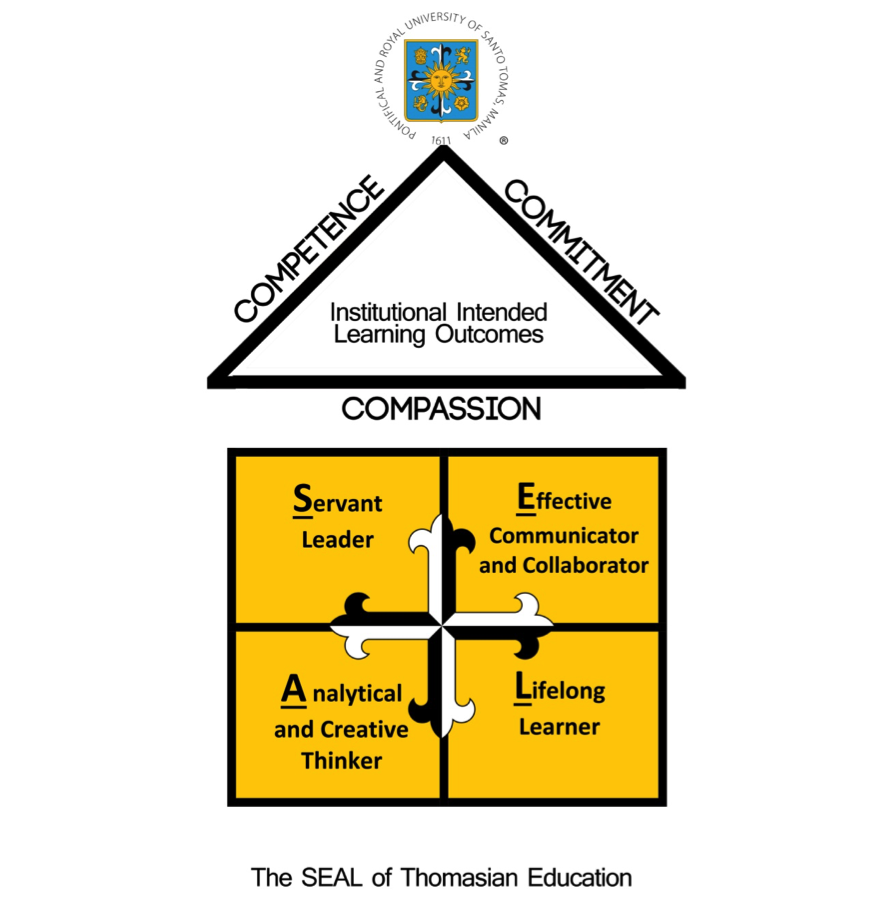
The University of Santo Tomas, in pursuit of truth, guided by reason and illumined by faith, dedicates herself to the generation, advancement, and transmission of knowledge to form competent and compassionate professionals committed to the service of the Church, the nation, and the global community.
I am a Thomasian. I carry the SEAL of Thomasian education. I am a S ervant leader, an E ffective communicator and collaborator, an A nalytical and creative thinker, and a L ifelong learner. With Christ at the center of my formation as a Thomasian, I am expected to demonstrate the following Thomasian Graduate Attributes ( ThoGAs ):
SERVANT LEADER
- Show leadership abilities to promote advocacies for life, freedom, justice, and solidarity in the service of the family, the local and global communities, the Church, and the environment.
- Implement relevant projects and activities that speak of Christian compassion to the poor and the marginalized in order to raise their quality of life.
- Show respect for the human person, regardless of race, religion, age, and gender.
EFFECTIVE COMMUNICATOR AND COLLABORATOR
- Express oneself clearly, correctly, and confidently in various environments, contexts, and technologies of human interaction.
- Work productively with individuals or groups from diverse cultures and demographics.
- Show profound respect for individual differences and/or uniqueness as members of God’s creation.
ANALYTICAL AND CREATIVE THINKER
- Show judiciousness and resourcefulness in making personal and professional decisions.
- Engage in research undertakings that respond to societal issues.
- Express personal and professional insights through an ethical and evidence-based approach.
LIFELONG LEARNER
- Engage in reflective practice to ensure disciplinal excellence and professional development.
- Exhibit preparedness and interest for continuous upgrading of competencies required by the profession or area of specialization.
- Manifest fidelity to the teachings of Christ, mediated by the Catholic Church, in the continuous deepening of faith and spirituality in dealing with new life situations and challenges.
PEO1. Exhibit Christian leadership by promoting life advocacies through project implementation for social and economic transformation
PEO2. Practice effective interpersonal and communication skills through collaboration, use of information technology, and respect for cultural heritage and diversity
PEO3. Assess industry-academe trends and issues to generate research and business undertakings in tourism and hospitality through the basis of specific standards and criteria within personal, professional, societal, and ethical contexts
PEO4. Employ a solid understanding and the need for continuous upgrading of the managerial and operational competencies of tourism and hospitality through reflective practice consistent with the global standards and Christian values
Upon successful completion of the program, graduates should be able to:
PO1. perform leadership skills in various areas of tourism through advocacy programs that aim to improve the quality of life of both local and global communities;
PO2. engage in meaningful collaboration, communication, and processing of information through technology to effectively perform assigned tasks in a diverse cultural environment;
PO3. apply analytical and quantitative skills to formulate business decisions producing quality research and business outputs that respond to tourism and hospitality issues and trends compliant with the laws of the society; and
PO4. demonstrate the ability to perform basic supervisory job functions, as well as entrepreneurial competencies, manifesting Christian values, in the tour, travel, leisure and recreation, and hotel and restaurant careers.
In addition, graduates of BS in Tourism Management Major in Travel and Operations Management should be able to create concrete plans for the different stakeholders through service learning, manifesting global innovations in varied forms of communication and collaboration (PO5-TOSM).
Application Period: July to December of each year
Application Website
Release of Results: January 28 of the following year
Go to THIS PAGE and look for the “College of Tourism and Hospitality Management” tab for the tuition fees.
Career Opportunities
Graduates of BS in Tourism Management, Major in Travel Operations and Service Management may be a/an:
Area Supervisor
Ground Handling Personnel
Training Staff
Area Manager
Group Coordinator
Ticketing Manager
Administrative Assistant
File Clerk
Tourism Center Director
Airline Purser
Flight Attendant
Airline Manager
Information Specialist
Tour Planner
Communications Specialist
Media Specialist
Travel Promotions Staff
Country Manager
Media Coordinator
Travel Representative
Customer Service Representative
Media Liaison
Travel Editor
Customer Service Quality Director
Manager of Travel Literature
Travel Photographer
Chief of News and Information
Operations Employee
Travel Writer
Director for Customer Care
Package Tour Coordinator
Travel Counselor (Domestic / International)
Economic Development Specialist
Product Development Manager
Research Analyst
Reservation Agents
Public Information Officer
Research Director
Reservations Manager
Public Relations Officer
Reservationist
Since the program includes business-related courses, a BS in Tourism Management graduate may also be a/an:
Sales Representative
Commercial Account Specialist
Trainee Group Consultant
Marketing Analyst
Sales and Marketing Manager
Customer Analyst
Advertising Specialist
Management Personnel (4 functional areas-HR, Marketing, Operations, Finance plus IT)
Financial Analyst
Marketing Coordinator
Senior Manager of Strategy and Marketing
Merchandising Analyst
Advertising Manager
Student Experience and Support
Department of Tourism Management Facilities
The University of Santo Tomas provides student services that cater to academic, spiritual, and wellness concerns of students. These support units are found in the different parts of the campus and can be accessed by Thomasians. When the University shifted to distance learning, the services also transitioned to online services to continue addressing the needs of Thomasians.
Program Curriculum (New)
Effectivity: A.Y. 2023-2024
This curriculum may have some changes upon the availability of new guidelines.
Effectivity: A.Y. 2021-2022
Effectivity: A.Y. 2019-2020
Effectivity: A.Y. 2018-2019
Student Life
The Tourism Management Department regularly offers immersion programs for the students to see and gain first-hand knowledge of how the industry works. From hotels, cruise lines, and community immersions, various adventures await you!
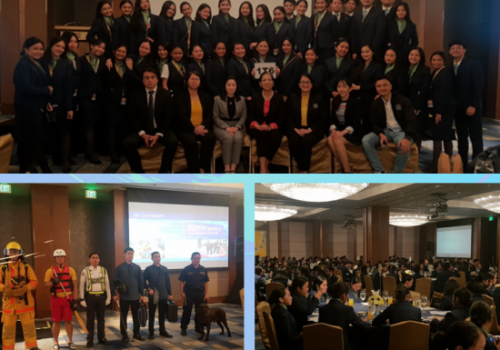
Our students regularly participate in various tourism-related contests, such as PHILTOA, UFTE, Domestikwhiz, TourCon, and HRT.
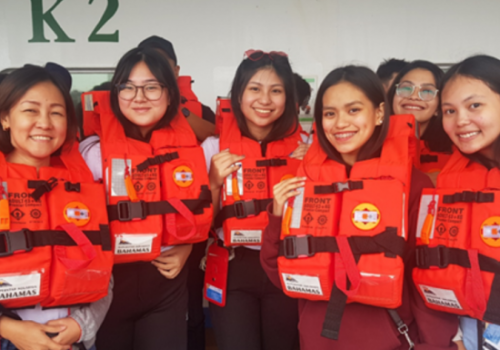
Apart from classroom learning and industry immersions, the college also has educational tour for the students. One of the most awaited highlights of being a Tourism Management student is the exciting domestic tours in Cebu, Bohol, Palawan and international tours in South Korea, Japan, China, Singapore, Malaysia, and Thailand.
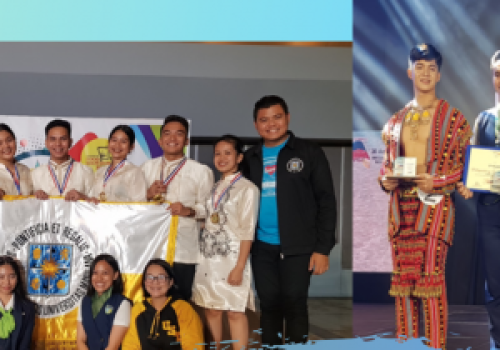
Our students are often invited to assist and become ushers for University activities inside and outside the campus giving them more exposure and a chance to practice service and hospitality skills they learn in the classroom namely, Papal Visit, diplomatic missions, national and international events, UAAP, etc.

The University of Santo Tomas is one of the leading private research universities in the Philippines and is consistently ranked among the top 1000 universities in the whole world. With academic degrees and research thrusts in the natural, health, applied, social, and sacred sciences, as well as business and management, the University continuously strives to make a positive impact on the society.
Visit Us: Espana Blvd., Sampaloc, Manila, Philippines 1008
Be Informed. Subscribe.
Send us your feedback.

© Copyright 2023. University of Santo Tomas. All Rights reserved. | Powered by Communications Bureau
- Register to study through Unisa
Undergraduate & honours qualifications
- Find your qualification & choose your modules
- All qualifications
Higher Certificate in Tourism Management
Who can register.
- Applicants (new applicants & Unisa students who applied for admission to a new qualification) may only register if they have received an offer of placement from Unisa and have accepted the offer online. Unisa reserves the right to not process and / or to cancel your registration if it is found that you were incorrectly admitted to a qualification.
- Re-registering students may register for the 2024 academic year once the registration period opens.
Please note: Should you wish to start a new qualification, please apply online for the alternative qualification during the prescribed application period.
How to choose your modules
Each Unisa qualification is structured in such a way that you need to pass a certain number of NQF level credits within a certain amount of time in order to graduate.
- Co-requisite: Module A is a co-requisite for Module B. You want to register for Module B, but have not yet passed Module A. You must then register for both Modules A and B simultaneously. You may NOT cancel your registration for Module A unless Module B is also cancelled.
Pre-requisite: If Module A is a pre-requisite for Module B, you must pass Module A before you may register for Module B.
You may not register for more than the allowed maximum number of credits / modules per academic year and / or semester: 60 credits per semester or 120 credits per academic year.
The maximum number of credits do not include supplementary and / or aegrotat examinations from a previous semester. Modules taken for non-degree / non-diploma purposes also count towards the maximum number of credits allowed.
You must take your available time into consideration when choosing your modules, as this will impact your academic performance. You need approximately
- 6 to 8 hours per week for semester modules.
- 4 to 6 hours per week for year modules.
Click here for more information on managing your studies.
Curriculum for this qualification
While you are deciding on the modules for which you will be registering, write down the module names and codes so that you have something to refer to when completing your registration.
Please click on the modules below to see further information (eg semester/year module, NQF level)
First level
- This is the levelIndex value 1

- www.mandela.ac.za

Change the world
- School Home Page
Qualifications offered
- Programme Information
- Programme Leaders
- M&D Programmes
These links will take you to our official Online Prospectus where you can obtain in-depth information on career fields, rules and regulations, admission requirements, curriculum and module details, and timetable information.
This department may present modules in other general undergraduate qualifications. To view these, please visit the Faculty web site.
Undergraduate
- Advanced Diploma in Business Studies (Tourism Management) (40404) - SECOND AVENUE CAMPUS , PART TIME
- Advanced Diploma in Business Studies (Tourism Management) (40404) - GEORGE CAMPUS , PART TIME
- Advanced Diploma in Business Studies (Tourism Management) (40404) - SECOND AVENUE CAMPUS , FULL TIME
- Diploma in Tourism Management (4648) - SECOND AVENUE CAMPUS , FULL TIME
- Diploma in Tourism Management (4647) - EXTENDED PROGRAMME GEORGE
- Diploma in Tourism Management (4647) - , FULL TIME EXTENDED SECOND AVE
- Diploma in Tourism Management (4648) - GEORGE CAMPUS , FULL TIME
- Bachelor of Commerce (General - Tourism) (40127) - SOUTH CAMPUS , FULL TIME
- Bachelor of Commerce (General - Tourism) (40197) - EXTENDED PROGRAMME
Postgraduate
Honours degree.
- Bachelor of Commerce Honours in Tourism Management (40522) - SOUTH CAMPUS , PART TIME
- Bachelor of Commerce Honours in Tourism Management (40522) - SOUTH CAMPUS , FULL TIME
Master's Degree
- Master of Commerce in Tourism Management (41030) - SECOND AVENUE CAMPUS , FULL TIME
- Master of Commerce in Tourism Management (41030) - SECOND AVENUE CAMPUS , PART TIME
- Master of Philosophy in Tourism Management (41300) - SECOND AVENUE CAMPUS , PART TIME
- Master of Philosophy in Tourism Management (41300) - SECOND AVENUE CAMPUS , FULL TIME
Doctoral Degree
- Doctor of Philosophy (Tourism Management) (41526) - SECOND AVENUE CAMPUS , FULL TIME
- Doctor of Philosophy (Tourism Management) (41526) - CONTINUATION , PART TIME
- Doctor of Philosophy (Tourism Management) (41526) - SECOND AVENUE CAMPUS , PART TIME
Work@Mandela
FindIt@Mandela

Commercial Services@Mandela
Tel: +27 (0) 41 504 1111
Fax: +27 (0) 41 504 2574 / 2731
Email: [email protected]
PO Box 77000, Nelson Mandela University
Gqeberha, 6031, South Africa
Connect@Mandela
- A - Z Index
- Privacy statement

Privacy statement Mail & Portals --> BEE & Tax Certificate PAIA ISPA FAQ Sitemap A - Z Index --> WCMS
Connect with us

- STUDY @ MANDELA
- LEARNING AND TEACHING
- RESEARCH, INNOVATION AND INTERNATIONALISATION
- ENGAGEMENT AND TRANSFORMATION
- LEADERSHIP AND GOVERNANCE
- FACULTIES AND SCHOOLS
- NEWS AND EVENTS
- STAKEHOLDERS AND SUPPLIERS
- Glossary of terms
- Career & study fields
- Module browser
- Module timetable
- Entry requirements
- Applicant Score calculator
- General financial information
- Frequently Asked Questions
- Quick guides
- Qualification details
Disclaimer : All reasonable steps have been taken to ensure that the information contained on the website is accurate at the date it was published. Nelson Mandela University reserves the right to make changes to the programme details (e.g. rules, admission requirements) as published on the website.
Create Personal Fee Estimation
Nb the following information is valid for 2024, diploma in tourism management.
- Rules & curriculum
- Faculty info
- Faculty regulations
Module Details
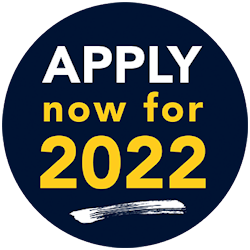
MAIL AND PORTALS
- Student Portal
- Staff Portal
- Student Mail
- Publications
- Report a Security Breach
- Ethics Hotline
- University social media
WORK@MANDELA
- Work environment
- +27 (0) 41 504 1111
- [email protected]
- PO Box 77000 Nelson Mandela University Gqeberha, 6031 South Africa
© 2023 Nelson Mandela University Privacy Statement / BEE & Tax Certificate / PAIA / ISPA / FAQ / Sitemap / --> Directory / WCMS

IMAGES
VIDEO
COMMENTS
Explore online tourism management courses and more. Develop new skills to advance your career with edX.
Pursuing a degree in hospitality management, tourism, hotel administration, or a related field provides a solid foundation of knowledge and skills necessary for success in the industry. ... Throughout this article, we have explored the common qualifications needed for hospitality and tourism careers. Education qualifications, such as degree ...
In summary, here are 10 of our most popular tourism courses. Sustainable Tourism - promoting environmental public health: University of Copenhagen. Sustainable high-end tourism: Universitat Autònoma de Barcelona. Hospitality Luxury Brand Management: Starweaver. Hotel Management: Distribution, Revenue and Demand Management: ESSEC Business School.
Over 200 million people work in the travel and tourism industry worldwide. Our travel and tourism training is designed to give you the skills and knowledge to maximize career opportunities in this rapidly expanding industry. From entry-level travel agent basics to senior management for agencies or tour operations, each course leads to an IATA ...
Hospitality management degrees are, foremost, degrees in business, says Michael Sabitoni, chair of the food and beverage management department and the international travel and tourism studies ...
Tourism management is a field of study that explores the theory and practice of creating, overseeing, and marketing tourism ventures. Management professionals in the tourism industry typically require skills in leadership, finance, and business operations. The online tourism management program offered by CSU has a unique focus on natural ...
To become a restaurant manager, you can get a high school diploma and work your way up to the position in a restaurant, or you can get a degree. Many restaurant management positions call for at least an associate degree in restaurant management or hospitality management. Average annual salary (US): $49,789.
Tourism management majors begin their studies with a strong business foundation—accounting, economics, business law, communications and computer applications. The degree program builds upon this foundation with industry-specific curriculum, such as destination marketing, festival planning, sustainable tourism, tourism management and more. ...
Sustainable Tourism Destination Management courses are offered in bundles of three a few times a year. Register for Courses 701, 702 and 703 Register for Courses 704, 705 and 706. For more information about the Professional Certificate in Sustainable Tourism Destination Management, please email us at [email protected].
The Certified Tourism Professional (CTP ®) is a globally recognized credential in the marketplace as the most relevant qualification for a career in tourism. The CTP® certification ensures the candidate understands how the business of tourism operate, how the business is managed, how the industry functions and how strategy is developed.
Department Information and Typical Discipline-Specific Academic Degree & Qualifications 1 of faculty within Hospitality and Tourism Management. The School of Hospitality and Tourism Management offers Bachelor's and Master's degrees in Hospitality Management and Certificate Programs that combine practical experience with classroom theory to assist the student to gain the understanding, skills ...
Purpose statement: The purpose of the Diploma: Tourism Management is to equip learners with generic business management expertise and appropriate practical skills within the context of the tourism industry. Qualifying learners will have a broad insight into tourism and a fundamental understanding of tourism management principles and theories.
Careers, Skills, Salaries, and More. Hospitality management involves all the tasks and aspects of managing a hospitality business. These businesses focus on welcoming customers and providing them with pleasant experiences through dining, lodging, events, entertainment, or travel. Take a closer look at how hospitality management is different ...
Our International Events, Leisure and Tourism Management MSc will provide you with strong academic and professional skills that will help Read more... 1 year Full time degree: £10,500 per year (UK) 2 years Part time day degree: £5,265 per year (UK) 2 years Part time evening degree: £5,265 per year (UK) Apply now Visit website Request info.
The Institute has all necessary complex of laboratories and classrooms, including a hotel room, a banquet hall, classes of Geography and Management in Tourism, IT-classes and a multi-training class. Electronic information educational environment allows students to obtain necessary educational information from all key world sources of knowledge.
Level 5 Advanced Diploma in Tourism Management. Undergraduate - Third year. Level 6 Professional Diploma in Tourism and Hospitality Management. Postgraduate Level. Level 7 Executive Diploma in Hospitality and Tourism Management. Bespoke. Centre Specific Qualifications. Culinary Programmes. Level 2 - Foundation.
The Confederation of Tourism & Hospitality was established in 1982 to provide recognised standards of management training appropriate to the needs of the hotel and travel industries, via its syllabi, examinations and awards. These have been continuously developed and improved to ensure they are relevant and up to date.
The international degree program "Vatel-RIAT" (giving possibility to get two diploma: Russian International Academy for Tourism and Hotel and Tourism Management school Vatel ) was established on the basis of the Russian international Academy for tourism in 2005 and has been successfully implementing the educational program of double degree "bachelor" in the field of "management", the direction ...
The BACHELOR OF SCIENCE IN TOURISM MANAGEMENT Major in Travel Operations and Service Management program covers the study of various components focusing on the management, operations, and service delivery relevant to the travel and tourism industry. It encompasses technical, practical, and professional learning and application of skills with respect to specific areas such as travel agency ...
This qualification will enable qualifying learners to: Have a fundamental understanding of tourism management theory and principles. Perform basic duties under supervision in the field of tourism management, for instance, general front office duties, do travel bookings, and provide customer care in this context.
This department may present modules in other general undergraduate qualifications. To view these, please visit the Faculty web site. Undergraduate. Diploma. Advanced Diploma in Business Studies (Tourism Management) (40404) - SECOND AVENUE CAMPUS , PART TIME; Advanced Diploma in Business Studies (Tourism Management) (40404) - GEORGE CAMPUS ...
Diploma in Tourism Management. Qualification details; ... Qualification type: 63 (Diploma) Introduction. The extended curriculum programme for NDip studies provides alternative university access to students who have the potential to succeed, but do not meet the minimum admission requirements for the mainstream programme. The purpose of the ...
In particular, large hotels and hotel chains, tourism operators, state and municipal cultural management agencies, sports and tourism, cultural institutions, and non-profit organizations that are actively involved in cultural and event tourism on both a global and national scale will be of interest to graduates of the programme.
In accordance with the rating of the Ministry of Education and Science of the Russian Federation, RGUTIS entered the category of effective universities and they recognize it as a national leader in the field of training for tourism and service. Faculties of Russian State University of Tourism and Service: Higher School of Business, Management ...
This free 45-hour training program, funded by the Rhode Island Department of Labor and Training's Real Jobs RI initiative, begins Tuesday, July 9 at CCRI's Liston Campus in Providence. ... and risk management can all be applied in this growing field." "The question of how people are supposed to learn skills about jobs that didn't ...